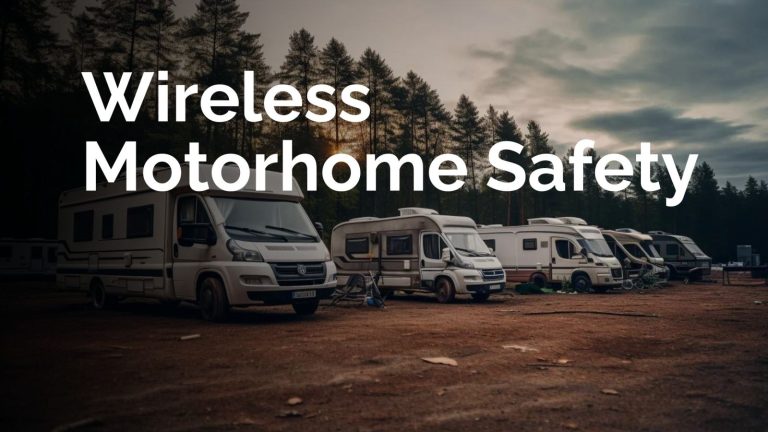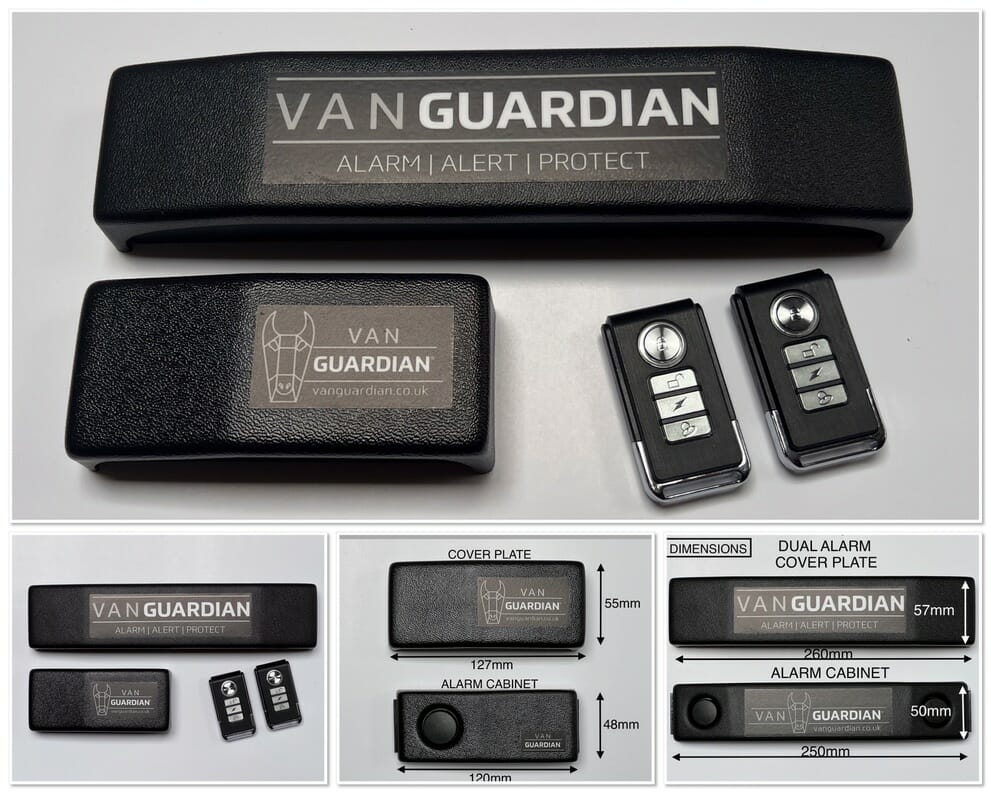

Securing your motorhome is of crucial importance, not just for the protection of your vehicle, but also for the peace of mind it brings. The necessity of alarm systems, particularly wireless motorhome alarms, has been increasingly recognised due to their advanced features and user-friendly nature.
A motorhome is a significant investment and often carries within it personal belongings of substantial value. Therefore, safeguarding it from potential threats is essential. An alarm system acts as a deterrent to potential intruders, reducing the chances of theft or damage. Furthermore, in the unfortunate event of a break-in, an alarm system can alert the owner promptly, allowing for swift action. We delve into the details of motorhome alarm systems in our article on motorhome alarm system.
In recent times, the popularity of wireless alarms for motorhomes has surged. There are several reasons behind this trend. Firstly, the ease of installation that wireless systems offer is a significant advantage over traditional wired systems, making them a preferred choice for many motorhome enthusiasts. Secondly, wireless alarms come with numerous advanced features such as remote monitoring and control, which provide the user with greater convenience and control over their motorhome security.
Moreover, with the ongoing advancements in technology, wireless alarms are becoming more reliable and efficient, making them a viable security solution for motorhomes. If you’re interested in understanding the features and benefits of a wireless motorhome alarm in detail, our article on motorhome security alarm provides a comprehensive overview.
To summarise, the security of your motorhome should never be compromised. Implementing a reliable alarm system, specifically a wireless one, can play a pivotal role in protecting your valuable asset and providing you with peace of mind. For a reliable and easy to install alarm system for your motorhome, checkout our Dual Alarm system from our Van Alarm Shop.

When it comes to securing your motorhome, understanding how a wireless alarm system works and its components is key. In this section, we will delve into the workings of a wireless motorhome alarm.
A wireless alarm system operates using radio frequency (RF) signals. The system consists of various sensors placed strategically around the motorhome, all connected to a central control panel. When a sensor detects an unusual event, such as a door or window opening, it sends a signal to the control panel. The panel then triggers an alarm, notifying you of the potential security breach.
One of the biggest advantages of wireless alarms is that they are not reliant on hard wires for communication. This allows for greater flexibility in terms of where sensors can be placed, and also reduces the risk of the system being disabled by cutting wires.
Wireless alarms can also be connected to a smartphone app or a professional monitoring service. This allows for remote monitoring, meaning you can keep an eye on your motorhome even when you’re not physically present. For more information on this, refer to our article on motorhome alarm system.
A wireless motorhome alarm system typically consists of several key components:
| Components | Function |
|---|---|
| Control Panel | Communicates with all sensors and triggers the alarm |
| Sensors | Monitor potential entry points and changes inside the motorhome |
| Alarm | Makes a loud noise or flashes lights when triggered |
| Key Fob/Remote Control | Allows system to be armed or disarmed from a distance |
| Backup Battery | Ensures system continues to function in case of power outage or tampering |
Wireless alarm systems are an important part of motorhome security, offering a convenient and effective way to protect your property. When combined with other security measures, they can provide comprehensive protection for your motorhome. For more ideas on additional security measures, check our article on motorhome security alarm.
Investing in a wireless motorhome alarm can provide numerous benefits, from enhancing security to providing peace of mind. Let’s delve into three key advantages: easy installation, remote monitoring, and advanced features.
One of the major benefits of a wireless motorhome alarm is the ease of installation. Unlike wired systems, wireless alarms don’t require extensive drilling or complex wiring, making the installation process less invasive and time-consuming. This also means less damage to the interior aesthetics of your motorhome.
Additionally, the flexible nature of wireless systems allows for easy expansion and reconfiguration. As your security needs change, you can add or remove components without the need for major adjustments or rewiring. For more details on installation, visit our guide on motorhome alarm system installation.
Wireless motorhome alarms often come with the ability to monitor your vehicle remotely. This means you can keep an eye on your motorhome from virtually anywhere, as long as you have access to a smartphone or computer.
Most systems will send alerts directly to your device if an intrusion is detected, enabling you to respond quickly, even if you’re not in close proximity to your motorhome. This level of connectivity and real-time monitoring significantly enhances the effectiveness of your motorhome security alarm.
Wireless alarms for motorhomes often boast advanced features that go beyond basic intrusion detection. These can include motion detectors, glass break sensors, and panic buttons, among others. Some systems also offer integration with smart home devices, enabling you to control your motorhome’s security using voice commands or through an app.
Many wireless alarms also have a battery backup feature, ensuring that your security system stays operational even in the event of a power outage. These advanced features provide an extra layer of security and convenience, making wireless alarms an appealing option for motorhome owners.
In conclusion, a wireless motorhome alarm system offers numerous benefits that can significantly enhance the security of your motorhome. By considering these benefits and your specific security needs, you can select a system that offers the best protection for your home on wheels.
Finding the right wireless alarm for your motorhome involves careful consideration. The right system can provide peace of mind and protect your valuable investment. This section discusses key considerations for selecting a wireless alarm and factors influencing the effectiveness of these security systems.
When selecting a wireless motorhome alarm, it’s essential to consider the following factors:
The effectiveness of a wireless motorhome alarm is influenced by several factors:
To ensure optimal performance, familiarize yourself with the alarm system’s features and operations. Regular maintenance and updates are also necessary. Read our article on motorhome alarm system for a comprehensive guide on maintaining and troubleshooting your alarm system.
In conclusion, selecting the appropriate wireless motorhome alarm requires careful consideration and research. The right system, when properly installed and maintained, provides comprehensive security for your motorhome, giving you peace of mind during your travels. For more information on enhancing your motorhome’s security, visit our article on motorhome security alarm.
After choosing a suitable wireless motorhome alarm, the next crucial steps are to correctly install and regularly maintain the system. These processes ensure that the alarm functions effectively, providing you with the peace of mind you deserve while enjoying the motorhome lifestyle.
The installation process for a wireless motorhome alarm can typically be completed without professional help, although the complexity can vary depending on the specific model. Here are some general steps:
For more detailed information on installation, consider reading our guide on motorhome alarm system.
Preserving the effectiveness of your wireless motorhome alarm involves regular maintenance and swift troubleshooting when necessary. Here are some tips:
To further enhance your motorhome’s security, consider combining your wireless alarm with additional security measures. Explore our article on motorhome security alarm for more insights.
Through correct installation and diligent maintenance, your wireless motorhome alarm can provide reliable security for your motorhome, allowing you to focus on enjoying your travels.
Securing your motorhome goes beyond installing a wireless motorhome alarm. It involves a comprehensive approach that combines the use of alarm systems with other security measures.
While a wireless alarm is a critical component of motorhome security, it works best when used in conjunction with other security measures. These additional measures include installing CCTV cameras, using physical security devices such as steering wheel locks and wheel clamps, and applying visible security markings on the motorhome.
The CCTV cameras aid in constant surveillance of your motorhome and can deter potential thieves. Physical security devices add an extra layer of protection, making it challenging for thieves to move or drive away your motorhome. Visible security markings can help in identifying your vehicle if it’s stolen.
Implementing a combination of these measures increases the overall security of your motorhome, providing a robust defense against theft attempts. You can find more details about these additional security measures in our article on motorhome security alarm.
To promote comprehensive security for your motorhome, it’s crucial to adopt a multi-layered security approach. This approach involves combining the wireless motorhome alarm system, additional security measures, and being vigilant about your motorhome’s security.
Remember to regularly test your wireless alarm system to ensure it’s functioning correctly. Additionally, maintain your CCTV cameras and physical security devices to ensure they remain effective. Always park your motorhome in well-lit and secure areas, and be cautious of the surroundings.
Finally, besides safeguarding your motorhome from theft, ensure the safety of the occupants as well. Install smoke and carbon monoxide detectors and regularly check their functionality.
By taking these steps, you can create a comprehensive security system that not only protects your motorhome but also provides peace of mind. For more information on creating an effective security system for your motorhome, refer to our article on motorhome alarm system.

Michael Horsfall, a seasoned plumbing and heating engineer with over 35 years of trade experience, is the innovative mind behind VanGuardian, a proactive van security solution. His journey into the realm of security was triggered by recurrent incidents of theft, particularly copper pipe theft right from outside his residence in Leeds. The rampant van crimes led him to envision VanGuardian, a patented alarm system engineered to deter theft by activating upon contact, safeguarding assets before any damage occurs. Michael's in-depth understanding of the challenges faced by tradesmen, paired with his endeavor on Dragons' Den to secure investment, underscores his commitment to fostering van safety. His profound expertise and real-world experience equip him with a distinctive insight, making his blogs an invaluable resource for individuals seeking pragmatic advice on van safety and security.

Copyright © 2021 VANGUARDIAN
VANGUARDIAN is a registered trademark of PROTEK-ONE, company no. 11802780.
